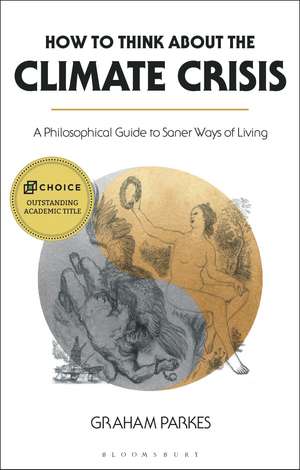How to Think about the Climate Crisis: A Philosophical Guide to Saner Ways of Living
Autor Graham Parkesen Limba Engleză Paperback – 25 noi 2020
| Toate formatele și edițiile | Preț | Express |
|---|---|---|
| Paperback (1) | 147.15 lei 22-36 zile | +27.01 lei 5-11 zile |
| Bloomsbury Publishing – 25 noi 2020 | 147.15 lei 22-36 zile | +27.01 lei 5-11 zile |
| Hardback (1) | 497.56 lei 43-57 zile | |
| Bloomsbury Publishing – 25 noi 2020 | 497.56 lei 43-57 zile |
Preț: 147.15 lei
Preț vechi: 159.42 lei
-8% Nou
Puncte Express: 221
Preț estimativ în valută:
28.16€ • 29.22$ • 23.54£
28.16€ • 29.22$ • 23.54£
Carte disponibilă
Livrare economică 24 februarie-10 martie
Livrare express 07-13 februarie pentru 36.100 lei
Preluare comenzi: 021 569.72.76
Specificații
ISBN-13: 9781350158870
ISBN-10: 1350158879
Pagini: 288
Dimensiuni: 138 x 216 x 22 mm
Greutate: 0.36 kg
Editura: Bloomsbury Publishing
Colecția Bloomsbury Academic
Locul publicării:London, United Kingdom
ISBN-10: 1350158879
Pagini: 288
Dimensiuni: 138 x 216 x 22 mm
Greutate: 0.36 kg
Editura: Bloomsbury Publishing
Colecția Bloomsbury Academic
Locul publicării:London, United Kingdom
Caracteristici
Draws on the ancient wisdom of the Chinese and Western traditions for ways to enjoy lives of lower consumption and higher fulfilment in a warmer world of scarcer resources
Notă biografică
Graham Parkes is Professorial Research Fellow in Philosophy at the University of Vienna, Austria. For over thirty years he has taught environmental philosophies and Asian and comparative thought at UC Santa Cruz, the University of Hawaii, and universities in China, Japan, and Europe. He is the editor of Nietzsche and Asian Thought (1991) and author of Composing the Soul: Reaches of Nietzsche's Psychology (1994).
Cuprins
PrefaceAcknowledgementsIntroductions (Background and Book)Part One Reality & Alternatives1. The Reality of Global Heating2. Specious Promethean SolutionsPart Two Covert Operations, Outrageous Obstructions3. The Rise of the Libertarians4. The Financial Clout of Fossil Fuels5. The Political Power of the Religious RightPart Three Finer Philosophies & Fairer Politics6. Libertarian Limitations, Religion's Contributions7. Political Philosophies, Greek and ChinesePart Four Lower Consumption, Higher Fulfilment8. Sage Advice from the Ancients9. A Good Life with Congenial ThingsInconclusions (What and How?)NotesSelect BibliographySuggestions for Further ReadingIndex
Recenzii
[A] superbly written book, which unlike most books on the environmental crisis, does more than expose the whats, the whys, and the hows of an extremely urgent, life-threatening global situation ... Climate Crisis is a must-read for anyone who wants to make an informed contribution to this discussion, but, more importantly, for anyone who is willing to change their way of thinking and living with the help of good research and good philosophy.
[T]his is an original and thoughtful book that genuinely has something new to say about the climate crisis, consumerism, and our relationship to the world more generally.
How to Think About the Climate Crisis draws on philosophical, political, and environmental sources and stands out within the growing climate-change literature.
An extremely well-written and passionate argument for action on climate change. Importantly, Parkes directly addresses the "China question," and goes beyond the political, philosophical, and moral Eurocentrism that characterizes much of the current debate.
Parkes here explores Confucianism and Daoism, not as some exotic relic of the "Oriental" past to be quixotically commended as a "solution" to the current environmental crisis-as did writers in the 1970s and '80s with such titles as "Tao Now!" Rather, Confucianism, Parkes persuasively argues, is the worldview of the ruling party in China, which is "communist" in name only. And he finds that foundational Western thought-e.g. Christianity as Pope Francis understands it and Plato's Republic-resonates with Confucian and Daoist ideas. Such a confluence could be the basis of an international consensus about reality and governance on which to begin to cope with global warming.
[T]his is an original and thoughtful book that genuinely has something new to say about the climate crisis, consumerism, and our relationship to the world more generally.
How to Think About the Climate Crisis draws on philosophical, political, and environmental sources and stands out within the growing climate-change literature.
An extremely well-written and passionate argument for action on climate change. Importantly, Parkes directly addresses the "China question," and goes beyond the political, philosophical, and moral Eurocentrism that characterizes much of the current debate.
Parkes here explores Confucianism and Daoism, not as some exotic relic of the "Oriental" past to be quixotically commended as a "solution" to the current environmental crisis-as did writers in the 1970s and '80s with such titles as "Tao Now!" Rather, Confucianism, Parkes persuasively argues, is the worldview of the ruling party in China, which is "communist" in name only. And he finds that foundational Western thought-e.g. Christianity as Pope Francis understands it and Plato's Republic-resonates with Confucian and Daoist ideas. Such a confluence could be the basis of an international consensus about reality and governance on which to begin to cope with global warming.
